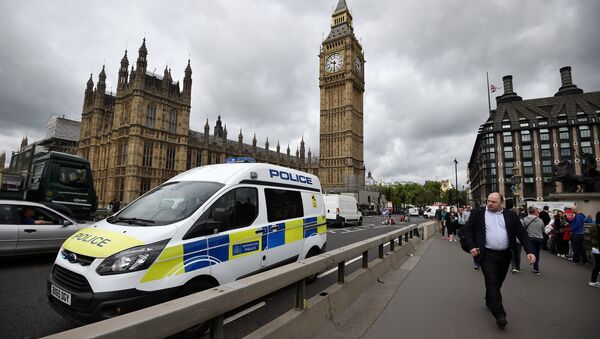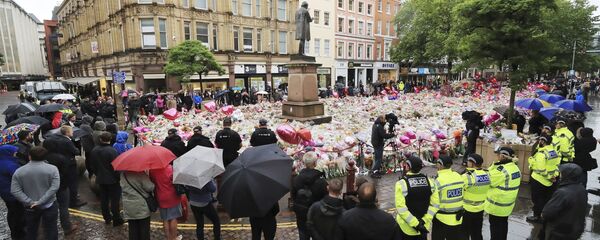LONDON (Sputnik) — The early election announced by the country's Prime Minister Theresa May from the ruling Conservative Party could result either in strengthening of the Conservatives' positions in the Parliament, and in losing the majority in the House of Commons.
NON-PHANTOM MENACE
Police will protect the majority of the stations in London, however the law enforcers refused to reveal the details, saying that they would keep control of the situation.
"A full review of the policing operation for Thursday had been carried out. Every borough will have a specific, dedicated policing operation. Across London there will be a specialist and highly flexible operation in place that can deploy and respond as needed," Scotland Yard's press service told Sputnik.
Press service of the National Counter Terrorism Policing Network confirmed that the security measures would be tightened across the country during the election day.
"Security around polling stations is constantly reviewed and updated by local police forces," the press service told Sputnik.
Local authorities have also promised to increase the number of police officers patrolling the streets of UK cities.
"Following the awful event of the weekend we are looking at all of the events where people will be gathering, whether that’s on the coast, whether that’s market places, and that will include the polling stations," Stephen Kavanagh, Essex Police’s chief constable, said, as quoted by the Echo news newspaper.
According to The Telegraph, West Midlands police said that there "will be an increase in patrols in some of the areas where voting is taking place."
The authorities of Westminster, located in London also promised to ensure safety of both voters and polls during the election.
"We are working closely with the police and colleagues to ensure Westminster's streets are as safe as possible, and arrangements for the general election form part of that planning," Charlie Parker, the chief executive of Westminster City Council, said, as quoted by the BBC broadcaster.
INFORMATION SECURITY
UK authorities are planning to take steps to prevent potential meddling in the election as well as violation of the country's electoral legislation.
Particularly, authorities of the London Borough of Tower Hamlets will introduce special zones outside almost all polling stations in order to cope with the allegations of electoral fraud, as almost half of such accusations in London since 2012 had been related to the borough.
"We have put in place tough and secure measures to combat fraud, and our response to allegations of fraud has been independently recognised as both prompt and robust by the Electoral Commission. We work closely with the police," the spokesman of the Tower Hamlets council said, as quoted by the Evening Standard.
"Over recent years, there have been reports of cyber attacks, using a variety of techniques, timed to coincide with elections around the world. Most of these attacks were distributed denial of service (DDoS) attacks against government and media websites, which overwhelmed the websites with traffic. Some seem to have been designed to steal data, or to alter or disrupt the publication of election results. There are also reports of activity apparently designed to influence voters or to undermine public confidence in election results or the electoral process. Sometimes this is facilitated by cyber activity," the NCSC's guidance for local authorities during the election said.
The guidance added that London paid a special attention to the reports of Washington about dangerous cyberactivities during the US election.
"Reports from the US Government of malicious cyber activity during last year’s presidential election, as well as recent claims that fake news stories may have influenced public opinion, have drawn attention to this. It can be difficult to know who is behind a cyber attack, but some of the attacks seen on other countries are likely to have been state-sponsored. Others probably involve hackers (some of whom may be working for hire), hacktivists or cybercriminals," the document added.
According to the guidance, the security measures also include briefings for politicians, lawmakers and people involved in campaigning focusing on the rules of work with passwords and classified information among others.
As the election day came closer, UK media returned to the topics related to the alleged "Russian threat" repeating their own materials about reported Moscow's interference in the elections in the United States and France. The Russian side has repeatedly refused such allegations saying that the reports were made in order to divert the public attention from domestic issues.





